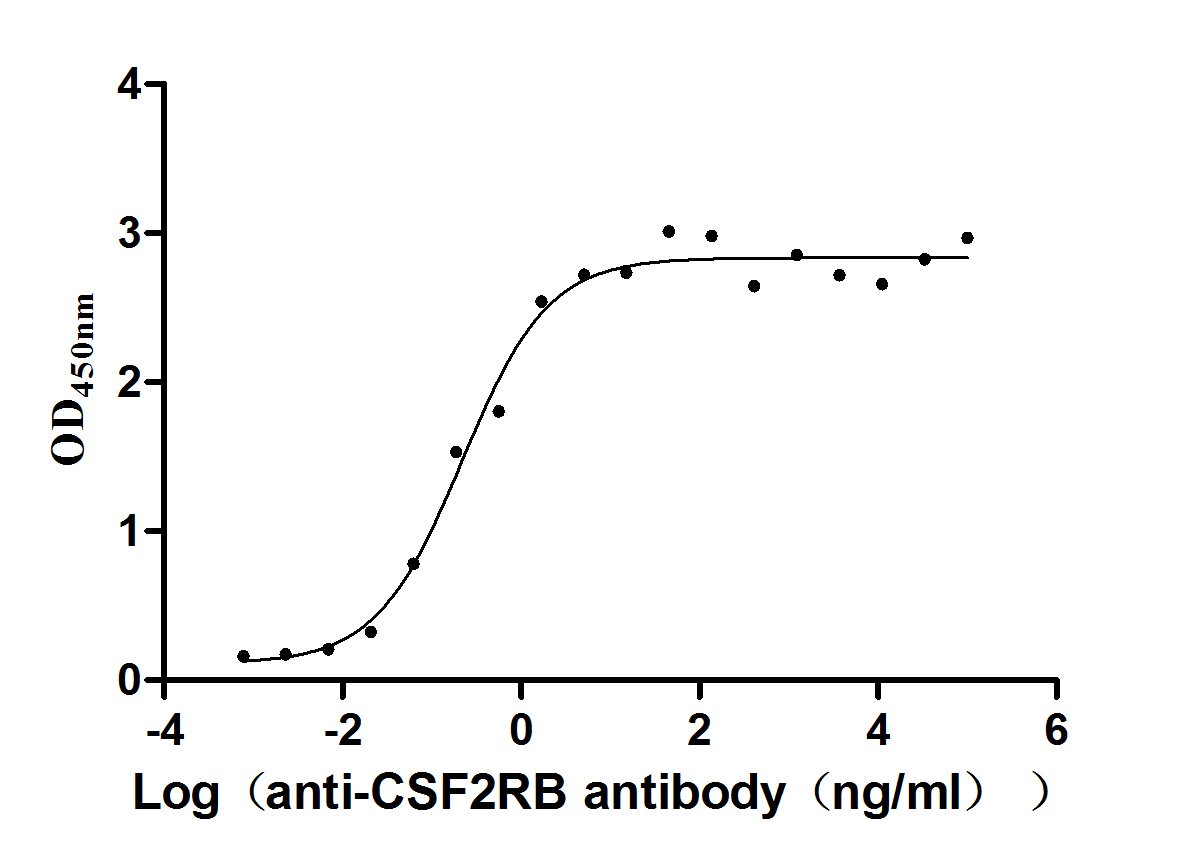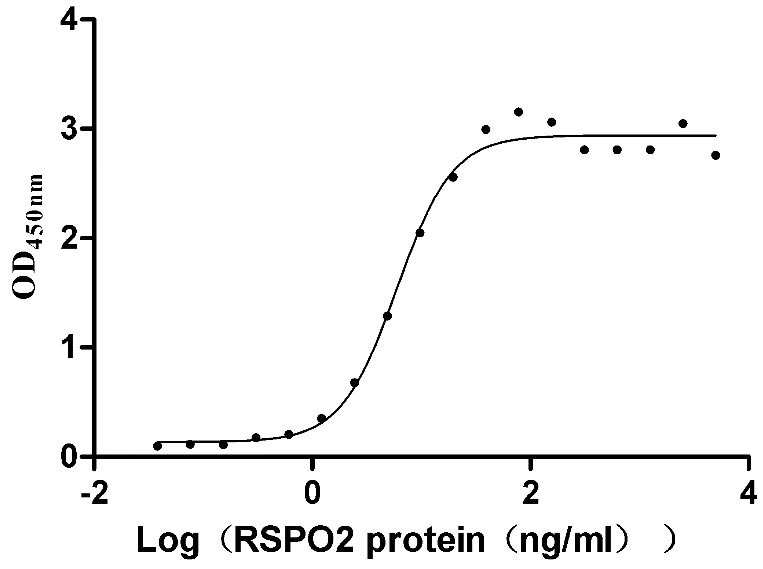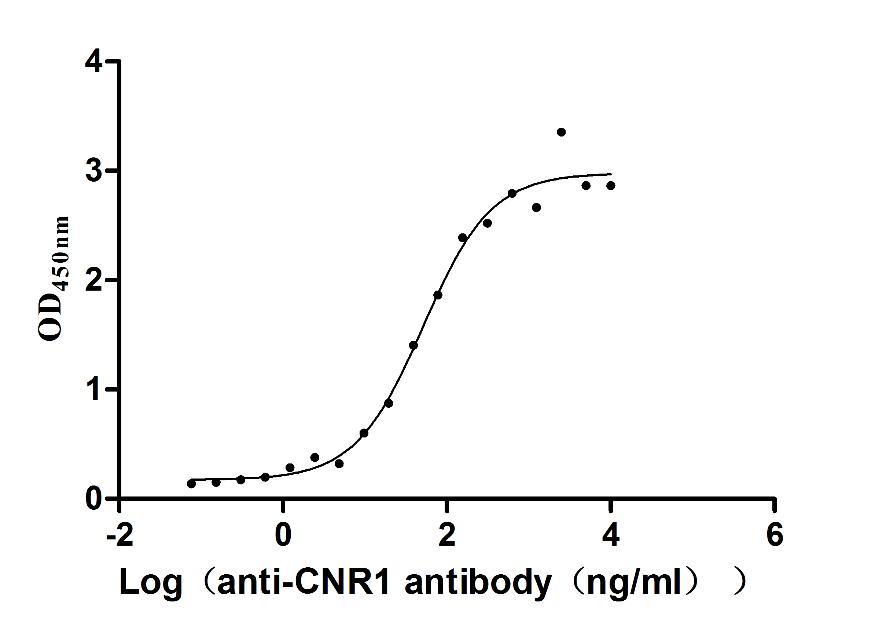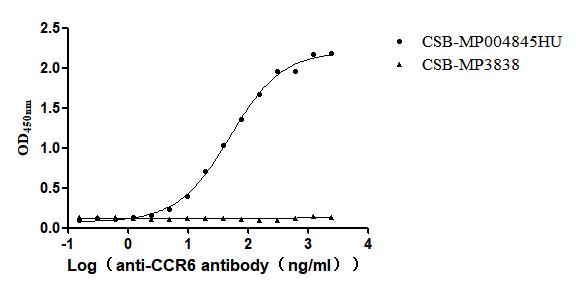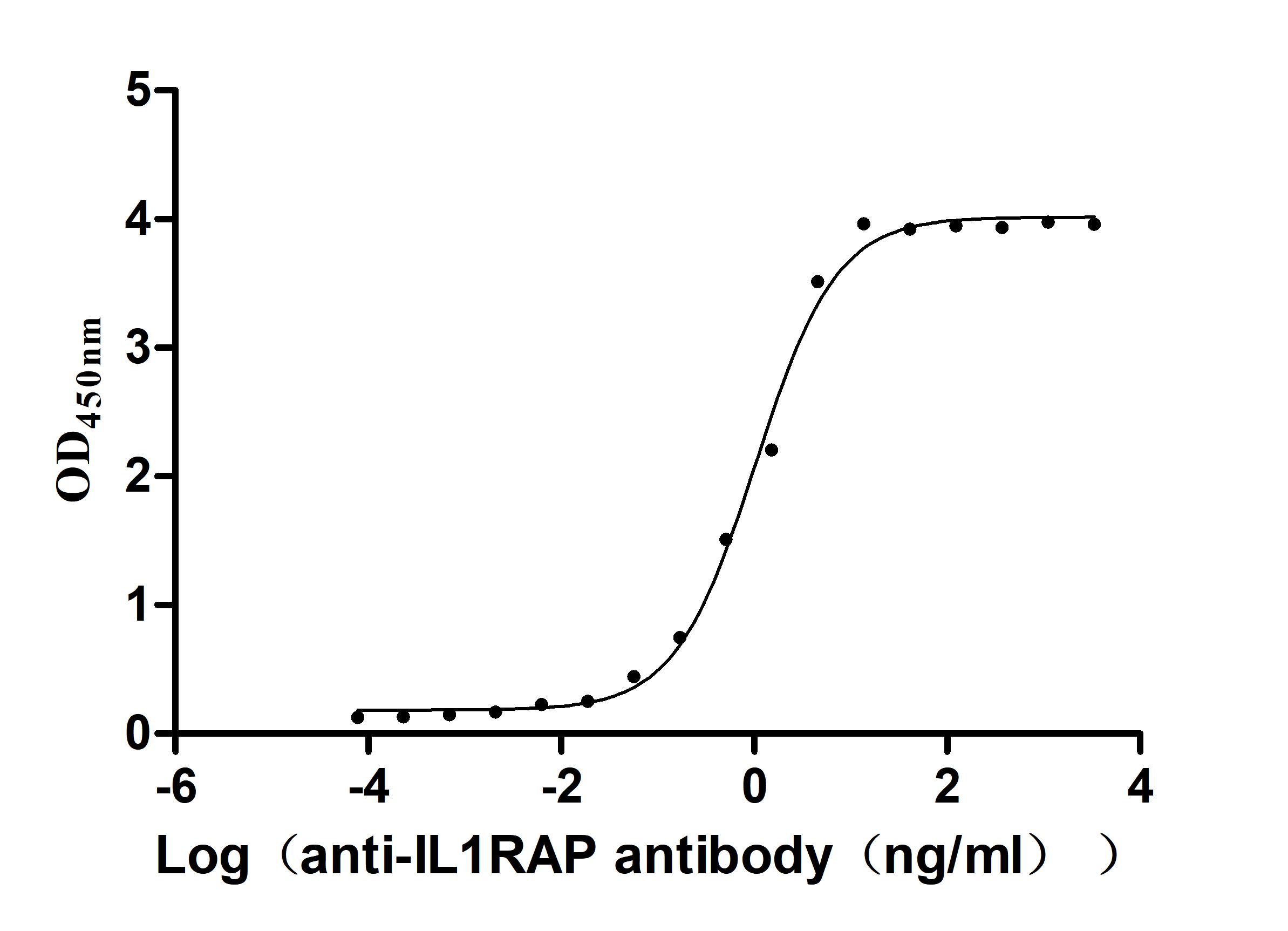Recombinant Mouse Estrogen receptor beta (Esr2)
-
货号:CSB-YP007831MO
-
规格:
-
来源:Yeast
-
其他:
-
货号:CSB-EP007831MO
-
规格:
-
来源:E.coli
-
其他:
-
货号:CSB-EP007831MO-B
-
规格:
-
来源:E.coli
-
共轭:Avi-tag Biotinylated
E. coli biotin ligase (BirA) is highly specific in covalently attaching biotin to the 15 amino acid AviTag peptide. This recombinant protein was biotinylated in vivo by AviTag-BirA technology, which method is BriA catalyzes amide linkage between the biotin and the specific lysine of the AviTag.
-
其他:
-
货号:CSB-BP007831MO
-
规格:
-
来源:Baculovirus
-
其他:
-
货号:CSB-MP007831MO
-
规格:
-
来源:Mammalian cell
-
其他:
产品详情
-
纯度:>85% (SDS-PAGE)
-
基因名:
-
Uniprot No.:
-
别名:Esr2; Estrb; Nr3a2; Estrogen receptor beta; ER-beta; Nuclear receptor subfamily 3 group A member 2
-
种属:Mus musculus (Mouse)
-
蛋白长度:Full length protein
-
表达区域:1-530
-
氨基酸序列MEIKNSPSSL TSPASYNCSQ SILPLEHGPI YIPSSYVESR HEYSAMTFYS PAVMNYSVPS STGNLEGGPV RQTASPNVLW PTSGHLSPLA THCQSSLLYA EPQKSPWCEA RSLEHTLPVN RETLKRKLGG SGCASPVTSP SAKRDAHFCA VCSDYASGYH YGVWSCEGCK AFFKRSIQGH NDYICPATNQ CTIDKNRRKS CQACRLRKCY EVGMVKCGSR RERCGYRIVR RQRSASEQVH CLNKAKRTSG HTPRVKELLL NSLSPEQLVL TLLEAEPPNV LVSRPSMPFT EASMMMSLTK LADKELVHMI GWAKKIPGFV ELSLLDQVRL LESCWMEVLM VGLMWRSIDH PGKLIFAPDL VLDRDEGKCV EGILEIFDML LATTARFREL KLQHKEYLCV KAMILLNSSM YPLATASQEA ESSRKLTHLL NAVTDALVWV ISKSGISSQQ QSVRLANLLM LLSHVRHISN KGMEHLLSMK CKNVVPVYDL LLEMLNAHTL RGYKSSISGS ECCSTEDSKS KEGSQNLQSQ
-
蛋白标签:Tag type will be determined during the manufacturing process.
The tag type will be determined during production process. If you have specified tag type, please tell us and we will develop the specified tag preferentially. -
产品提供形式:Lyophilized powder
Note: We will preferentially ship the format that we have in stock, however, if you have any special requirement for the format, please remark your requirement when placing the order, we will prepare according to your demand. -
复溶:We recommend that this vial be briefly centrifuged prior to opening to bring the contents to the bottom. Please reconstitute protein in deionized sterile water to a concentration of 0.1-1.0 mg/mL.We recommend to add 5-50% of glycerol (final concentration) and aliquot for long-term storage at -20℃/-80℃. Our default final concentration of glycerol is 50%. Customers could use it as reference.
-
储存条件:Store at -20°C/-80°C upon receipt, aliquoting is necessary for mutiple use. Avoid repeated freeze-thaw cycles.
-
保质期:The shelf life is related to many factors, storage state, buffer ingredients, storage temperature and the stability of the protein itself.
Generally, the shelf life of liquid form is 6 months at -20°C/-80°C. The shelf life of lyophilized form is 12 months at -20°C/-80°C. -
货期:Delivery time may differ from different purchasing way or location, please kindly consult your local distributors for specific delivery time.Note: All of our proteins are default shipped with normal blue ice packs, if you request to ship with dry ice, please communicate with us in advance and extra fees will be charged.
-
注意事项:Repeated freezing and thawing is not recommended. Store working aliquots at 4°C for up to one week.
-
Datasheet :Please contact us to get it.
靶点详情
-
功能:Nuclear hormone receptor. Binds estrogens with an affinity similar to that of ESR1/ER-alpha, and activates expression of reporter genes containing estrogen response elements (ERE) in an estrogen-dependent manner.
-
基因功能参考文献:
- Study traced individual dendritic spines on layer V pyramidal neurons of the primary sensory cortex in adult female mice under 17beta-estradiol (E2) intervention using two-photon in vivo imaging microscopy; found increase of the spine density upon E2 treatment in the intact cortex due to the promotion of spine formation and the stability of newly formed spines. PMID: 29288734
- Estrogen receptor beta modulates mitochondrial permeability transition by regulating CypD interaction with OSCP. PMID: 29550215
- These data demonstrate chemoarchitectural differences in ERbeta neurons of the mouse paraventricular nucleus. PMID: 28758220
- Study found that estrogen receptor beta (ERbeta) was expressed in the motoneurons of lumbar ventral horn. ERalpha and ERbeta were mainly localized in the nuclei of motoneurons with less immunoreactivity in the cytoplasm. PMID: 28501695
- Data suggest that expression of Usp19 in skeletal muscle can be regulated by dietary factors; here, supplementation with phytoestrogen daidzein down-regulates Usp19 expression via Esrb signaling and increases skeletal muscle mass. (Usp19 = ubiquitin-specific peptidase 19; Esrb = estrogen receptor beta) PMID: 28886438
- Data suggest that one alternative splicing variant of Esr2 is "super-activated" by xenoestrogens; here, samples isolated from soil around a landfill site in the United Kingdom appear to contain xenoestrogens that induce cholangitis. PMID: 28013213
- ERbeta might be the target protein of arctigenin responsible for inhibition of mTORC1 activation and resultant prevention of Th17 cell differentiation and colitis development. PMID: 27863380
- Results provide evidence that ERbeta prevents cardiac fibroblasts to undergo fibrosis development. PMID: 27321970
- These data highlight a new role for ER-beta in adipose biology and its potential to be a safer alternative peripheral therapeutic target for obesity. PMID: 27733447
- Results indicated that puerarin is neuroprotective against Abeta1-42 toxicity via the activation of estrogen receptors, and ERbeta plays a key role in the process. Rindings provide a potential strategy for the prevention of neurodegeneration and the treatment of Alzheimer's disease. PMID: 27923632
- Phosphorylation of myosin regulatory light chain triggered by E2 was found to be mediated by estrogen receptor-beta and the G protein-coupled estrogen receptor. PMID: 26956186
- MMP-19 is an estrogen receptor beta target gene, where ERbeta requires a specific Sp1 site on the MMP-19 promoter to mediate ligand dependent transcription. PMID: 26700939
- deletion of ERbeta specifically in osteoblast lineage cells, in the absence of all splice variants, increases trabecular bone mass and modulates multiple pathways related to bone metabolism. PMID: 26418452
- ERbeta does not play a crucial role in the organization and activation of the neural circuitry underlying male sexual behavior. These discrepancies with the phenotype of global ERbeta knockout models are discussed. PMID: 26836767
- The results of this study suggest that ERbeta in the MPOA and MeA are involved in the regulation of male sexual and aggressive behavior. PMID: 27066533
- Buk music reduced levels of tumor necrosis factor-alpha, and significantly increased estrogen receptor-beta mRNA levels in brain using Buk music as a means of treating anaphylaxis. PMID: 26418257
- ERbeta-exerted regulation of PPARgamma expression and activity is critical for diosgenin-inhibited adipocyte differentiation. PMID: 26408789
- Study reveals how endometrial tissue generated by retrograde menstruation can escape immune surveillance and develop into sustained ectopic lesions via gain of ERbeta function. PMID: 26544941
- found that ERbeta is targeted for repression in prostate cancer caused by PTEN deletion and that loss of ERbeta is important for tumor formation PMID: 25818291
- In model of chronic unpredictable mild stress significant (P<0.05) increase in ERbeta mRNA and protein expression levels in hippocampus and cortex in mice. PMID: 25837835
- Estrogen replacement treatment in ovariectomized ER beta KO mice caused a significant increase in Col2 expression, no change in ER alpha expression PMID: 25046534
- Neonatal ERbeta is important for the persistent inhibition of epithelial cell proliferation in the neonatal and adult mouse uterus. PMID: 26020796
- Chronic treatment with CE increases ER-b but not ER-b expression in cerebral microvessels of OVX rats. Aging appears to reduce the normal ability of estrogen to increase ER-a expression in postischemic cerebral microvessels PMID: 25010766
- Data indicate that the proteomic response of the heart to pressure overload (PO) is significantly modulated by estrogen receptor (ER) and sex. PMID: 25406860
- This study demonstrates sex differences in NR1 subunit density and trafficking in ERbeta-EGFP dendrites in the mouse PVN. Age differences in females are also shown. PMID: 24639345
- Very little of ERbeta transcriptional activity depends on binding to classical estrogen response elements. PMID: 25848008
- This study is the first study to estimate protein expression changes in urethras from ERbeta(-/-) female mice. PMID: 25275480
- The sex-specific response of the heart to exercise is modulated by ERbeta. PMID: 24654233
- Deficiency of ERbeta and prostate tumorigenesis in FGF8b transgenic mice PMID: 24938408
- Estrogen and ERbeta regulate Tnfaip1 expression in mouse hippocampus. PMID: 24737445
- ESR2 is not necessary within the pituitary and hypothalamus for the generation of a normal LH surge and for normal fertility, but ESR2 is essential within the ovary to provide proper signals. PMID: 24337314
- we found developmental alterations and sex difference in ERbeta expression within various brain regions PMID: 23818057
- Sex-specific expression of a microRNA network is via ERbeta in the hypertrophied heart. PMID: 24157234
- ERbeta plays both ligand-dependent and ligand-independent roles in mechanical signaling in osteoblasts. One mechanism by which ERbeta regulates mechanotransduction in osteoblasts may result from its inhibitory effect on ERalpha expression and function. PMID: 24619882
- results demonstrate that ERbeta could play positive roles in promoting BCa progression via MCM5 regulation PMID: 24148819
- Estrogen receptor beta activity helps to maintain the intestinal stem cell microenvironment by modulating epithelial-stromal crosstalk. PMID: 24104551
- Estrogen receptor beta expression in oligodendrocytes is required for attenuation of multiple sclerosis by the ERbeta ligand diarylpropionitrile. PMID: 24191028
- This study demonistrated that estrogen receptor beta in maintenance of serotonergic neurons of the dorsal raphe. PMID: 22665260
- Estrogen receptor beta might have a role in cancer chemoprevention. PMID: 23447562
- results suggest that ERbeta deficiency increases condylar growth in female mice by inhibiting the turnover of fibrocartilage PMID: 23197372
- The mechanism of neuronal calcium influx is examined, as well as the contribution of the two estrogen receptor (ER) isotypes, ERalpha and ERbeta, to estrogenic modulation of intracellular calcium content. PMID: 22406418
- In the skin of estrogen receptor beta -/- mice, collagen content was decreased despite increased production. The expression of matrix metalloproteinases 8 and 15 was significantly elevated. PMID: 22895361
- Knockout of estrogen receptor beta under conditions of low estradiol allow estrogen receptor alpha-mediated transcription. PMID: 23392694
- ERbeta-deficient colons presented greater number and size of polyps at weeks 9 and 16, respectively. PMID: 22488198
- The results indicate that ERbeta regulates the expression of NHE3 in the proximal colon of pregnant mice through estrogen action, suggesting the involvement of increased sodium absorption by up-regulated NHE3 in constipation during pregnancy. PMID: 22358497
- These results reveal a novel benefit of ERbeta activation for prostate disease. PMID: 22808245
- findings suggest the implication of Trk A and Src in ERbeta mediated brain functions and related disorders during aging PMID: 22011838
- In ESR1 knockout mice, estradiol exerted its action in gonadotropes via ESR2. PMID: 22367588
- ERbeta may play a major role in decreasing tumorigenesis and that it may affect breast cancer cell proliferation and survival PMID: 22006184
- mouse spermatogonial stem cells expressed Tex11, Hpip, and Esr2 but not Esr1, and in cultured cells, TEX11 competed with Esr2 for binding to HPIP. PMID: 22383461
显示更多
收起更多
-
亚细胞定位:Nucleus.
-
蛋白家族:Nuclear hormone receptor family, NR3 subfamily
-
组织特异性:Expressed in prostate, ovary, Leydig cells and in epithelium of the efferent ductules and of the initial segment of the epididymis.
-
数据库链接:
KEGG: mmu:13983
STRING: 10090.ENSMUSP00000098849
UniGene: Mm.2561
Most popular with customers
-
Recombinant Human Cytokine receptor common subunit beta (CSF2RB), partial (Active)
Express system: Mammalian cell
Species: Homo sapiens (Human)
-
Recombinant Human E3 ubiquitin-protein ligase ZNRF3 (ZNRF3), partial (Active)
Express system: Mammalian cell
Species: Homo sapiens (Human)
-
Recombinant Human Cannabinoid receptor 1 (CNR1)-VLPs (Active)
Express system: Mammalian cell
Species: Homo sapiens (Human)
-
Recombinant Human Myosin regulatory light chain 12A (MYL12A) (Active)
Express system: E.coli
Species: Homo sapiens (Human)
-
Recombinant Human C-C chemokine receptor type 6(CCR6)-VLPs (Active)
Express system: Mammalian cell
Species: Homo sapiens (Human)
-
Recombinant Macaca fascicularis Interleukin 1 receptor accessory protein(IL1RAP), partial (Active)
Express system: Mammalian cell
Species: Macaca fascicularis (Crab-eating macaque) (Cynomolgus monkey)


